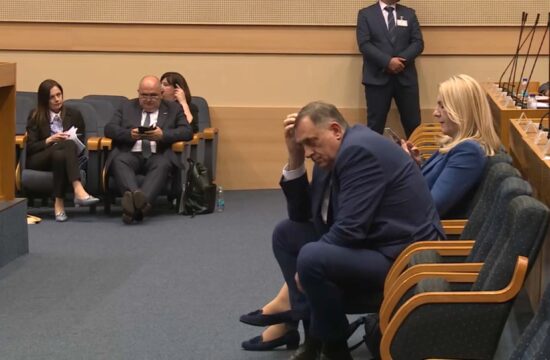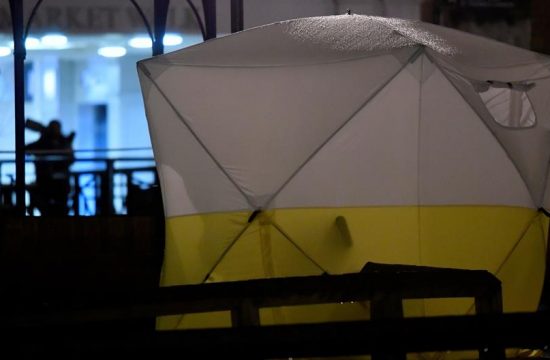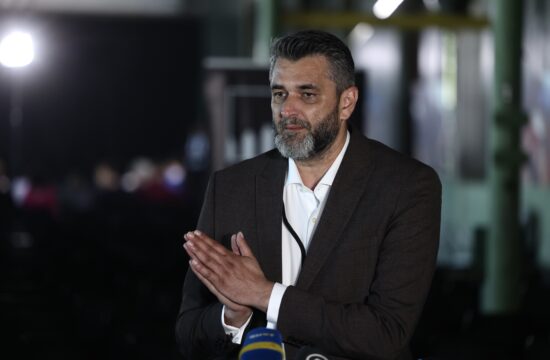US Ambassador Maureen Cormack and Head of the EU Delegation to Bosnia and Herzegovina Lars-Gunnar Wigemark hosted a meeting with representatives of local political parties on changes to the Bosnia's Election Law in Sarajevo on Wednesday. Following the meeting the leaders expressed content with the progress they achieved in talks.
Party of Democratic Action (SDA)'s leader, Bakir Izetbegovic, emphasized following the meeting that leaders of the four parties that took part in the talks – SDA, Alliance for Better Future (SBB BiH), Social Democratic Party (SDP) and Democratic Front (DF) – had a joint stance regarding the electoral legislation.
“We have a joint stance of representatives of these four parties, which is that it is necessary to try to fix the asymmetric solutions in the Council of Peoples of the Republika Srpska entity (the RS) and the House of Peoples of the Federation of Bosnia and Herzegovina (the FBiH) entity. Secondly, that all we do has to be based on the 1991 population census, i.e. the constitutional obligation to have everything based on the 1991 population census. Thirdly, that it is not possible to give up on having every canton being represented by all three peoples if they are elected in cantonal assembly. In case of objections about some manipulations regarding the ethnic representation, the Central Election Commission (CEC) should fix that. Finally, we agreed it was necessary to fully implement proportional representation. ‘Ljubic’ decision has to be fully implemented,” said Izetbegovic.
SBB BiH leader, Fahrudin Radoncic, also said the parties that took part in the talks shared identical stance on the matter and that significant progress was made during the meeting.
“We want the regulations from 1991 to be respected, because Annex 7 has not been implemented. We want to try to reach agreement on the FBiH House of Peoples becoming similar to the RS Council of Peoples, in order to avoid asymmetry with the RS. We don't see it as a problem to increase number of delegates from 17 to more. I think that this is a negotiating platform that legitimate representatives of the Croat corpse should declare on. I think it is good that we, as a pro-Bosnian bloc, presented our options and thoughts today,” underlined Radoncic.
He could not tell if the electoral legislation changes would be adopted within the set deadlines, noting that it also depended on partners from the Croat people.
Speaking about possible new competences of the FBiH House of Peoples, SBB BiH leader said that this chamber would declare on possible violation of the vital national interest but not as today, when it practically possesses same or even higher competences than the House of Representatives.
Leader of SDP, Nermin Niksic, agreed that a progress was made and that participants of the meeting demonstrated readiness for cooperation.
“…and we expect other parties in the FBiH to show the same interest so we can finally reach a solution, to have authorities that will represent the result of political will of citizens. They are here to talk, they do not support any political party or any representative of political parties or any solution. It is very important that we had this today, to agree on how we see the further solution searching,” Niksic noted.
DF leader, Zeljko Komsic, expressed content over the meeting's results, emphasizing this was a joint stance of not four Bosniak parties but of four parties with headquarters in Sarajevo.
Asked about possible HDZ BiH's reaction, Komsic replied that this was a way to implement the court's decision in ‘Ljubic’ case.
“I will also refer to the words of the international community's representatives, who took part in the talks – if you ant a compromise, no one gets everything. You cannot get everything,” Komsic noted, adding that it is necessary to hear HDZ BiH's stance in further talks.
There was information that the meeting would also be attended by Director for South Central European Affairs at the US Department of State, Matthew Palmer, but no details were provided after the talks.




